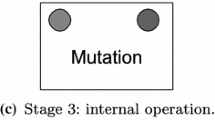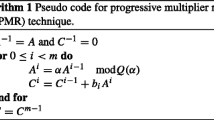Summary
We present a mathematically rigorous and, at the same time, convenient method for systolic design and derive systolic designs for three matrix computation problems. Each design is synthesized from a simple program and a proposed layout of processors. The synthesis derives a systolic parallel execution, channel connections for the proposed processor layout, and an arrangement of data streams such that the systolic execution can begin. Our choices of designs are governed by formal theorems. The synthesis method is implementable and is particularly effective if implemented with graphics capability. Our implementation on the Symbolics 3600 displays the resulting designs and simulated executions graphically on the screen. The method's centerpiece, a transformation of sequential program computations into systolic parallel ones, has been mechanically proved correct.
Similar content being viewed by others
References
Boyer, R.S., Moore, J.S.: A Computational Logic. ACM Monograph Series. New York: Academic Press 1979
Cappello, P.R., Steiglitz, K.: Unifying VLSI Array Design with Linear Transformations of Space-time. In: Advances in Computing Research, F.P. Preparata, (ed.) VLSI Theory, Vol. 2, pp. 23–65. Greenwich, CT: JAI Press Inc. 1984
Chandy, M.: Concurrent Programming for the Masses. Proc. 4th Ann. ACM Symp. on Principles of Distributed Computing, pp. 1–12 (1985)
Chandy, K.M., Misra, J.: Systolic Algorithms as Programs. Distrib. Comput. 1, 3, 177–183 (1986)
Chen, M.C.: Synthesizing Systolic Designs. YALEU/DCS/RR-374, Department of Computer Science, Yale University, March 1985
Chen, M.C.: A Parallel Language and Its Compilation to Multiprocessor Machines or VLSI. Proc. 13th Ann. ACM Symp. on Principles of Programming Languages, pp. 131–139 (1986)
Delosme, J.-M., Ipsen, I.C.F.: Design Methodology for Systolic Arrays. Proc. SPIE Symposium, Vol. 696, Advanced Algorithms and Architectures for Signal Processing, pp. 245–259 (1986)
Fortes, J.A.B., Moldovan, D.I.: Parallelism Detection and Transformation Techniques for VLSI Algorithms. J. Parallel Distrib. Comput. 2, 277–301 (1985)
Huang, C.-H., Lengauer, C.: An Incremental, Mechanical Development of Systolic Solutions to the Algebraic Path Problem. TR-86-28, Department of Computer Sciences, The University of Texas at Austin, December 1986
Huang, C.-H., Lengauer, C.: An Implemented Method for Incremental Systolic Design. In: Parallel Architectures and Languages Europe (PARLE). J.W. de Bakker, A.J. Nijman, P.C. Treleaven, (eds.) Parallel Architectures, Vol. 1, pp. 160–177, Lecture Notes in Computer Science 258. Berlin, Heidelberg, New York, Tokyo: Springer 1987
Knuth, D.E.: The Art of Computer Programming, Vol. 3: Sorting and Searching Sect. 5.3.4. Reading, MA: Addison-Wesley 1973
Kung, H.T., Leiserson, C.E.: Algorithms for VLSI Processor Arrays. In: Introduction to VLSI Systems, Sect. 8.3., C. Mead, L. Conway (eds.). Reading, MA: Addison-Wesley 1980
Lam, M.S., Mostow, J.: A Transformational Model of VLSI Systolic Design. Computer 18, 42–52 (1985)
Leiserson, C.E.: Systolic and Semisystolic Design (Extended Abstract). Proc. IEEE Int. Conf. on Computer Design/VLSI in Computers, pp. 627–632 (ICCD '83), 1983
Leiserson, C.E., Saxe, J.B.: Optimizing Synchronous Systems. J. VLSI Comput. Syst. 1, 41–67 (1983)
Lengauer, C.: A Methodology for Programming with Concurrency: The Formalism. Sci. Comput. Programming 2, 19–52 (1982)
Lengauer, C., Huang, C.-H.: A Mechanically Certified Theorem about Optimal Concurrency of Sorting Networks. Proc. 13th Ann. ACM Symp. on Principles of Programming Languages, pp. 307–317 (1986)
Li, G.-H., Wah, B.W.: The Design of Optimal Systolic Arrays. IEEE Trans. Comput. 34, 66–77 (1985)
Miranker, W.L., Winkler, A.: Spacetime Representations of Computational Structures. Computing 32, 93–114 (1984)
Moldovan, D.I.: On the Design of Algorithms for VLSI Systolic Arrays. Proc. IEEE 71, 113–120 (1983)
Moldovan, D.I., Fortes, J.A.B.: Partitioning and Mapping Algorithms into Fixed Size Systolic Arrays. IEEE Trans. Comput. 35, 1–12 (1986)
Quinton, P.: The Systematic Design of Systolic Arrays. TR84-11, Microelectronics Center of North Carolina, May 1984
Rao, S.K.: Regular Iterative Algorithms and their Implementations on Processor Arrays. Ph.D. Thesis, Department of Electrical Engineering, Stanford University, October 1985
Rote, G.: A Systolic Array Algorithm for the Algebraic Path Problem (Shortest Paths; Matrix Inversion). Computing 34, 191–219 (1985)
van de Snepscheut, J.L.A.: A Derivation of a Distributed Implementation of Warshall's Algorithm. Sci. Comput. Programming 7, 55–60 (1986)
Weiser, U., Davis, A.: A Wavefront Notation Tool for VLSI Array Design. In: VLSI Systems and Computations, H.T. Kung, B. Sproull, G. Steele (eds.) Rockville, MA: Computer Science, pp. 226–234. Press 1981
Author information
Authors and Affiliations
Rights and permissions
About this article
Cite this article
Huang, CH., Lengauer, C. The derivation of systolic implementations of programs. Acta Informatica 24, 595–632 (1987). https://doi.org/10.1007/BF00282618
Issue Date:
DOI: https://doi.org/10.1007/BF00282618




